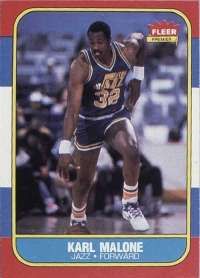Position: Forward
Few players of recent vintage have been as dependable as Karl Malone. Through his first 18 years in the NBA, the Utah Jazz muscle man missed just 10 games, won two All-Star Game Most Valuable Player Awards, won two regular season MVPs, and captured gold medals at the 1992 and 1996 Olympic Games.
Advertisement
In a 1992 poll of NBA coaches and general managers by Sports Illustrated, Malone was voted the best forward in the game by more than a two-to-one margin over Charles Barkley.
Nicknamed "The Mailman" because he always delivered, Malone revolutionized the power-forward position in the 1980s and 1990s. No player before him had ever boasted a like combination of size (6'9'', 256 pounds) and speed.
The NBA discovered quickly that Malone was a runaway train on the fastbreak. Opponents who got in his way risked injury as well as the possibility of a three-point play. Malone led the NBA in free-throw attempts for five consecutive seasons from 1988-1989 to 1992-1993 and seven times overall.
Malone's contributions weren't limited to layups and dunks. His strength and bulk made him nearly unstoppable in the low post; he was a bulldog on the boards, and his outside shooting and passing improved dramatically as his career wore on.
Defensively, he relished the rough and tumble of the NBA, to the point that opponents such as Dominique Wilkins accused him of dirty play. In a game against Detroit in 1991, he elbowed Pistons guard Isiah Thomas, opening a gash above Thomas's left eye that required 40 stitches.
The eighth of nine children, Malone was born July 24, 1963, in rural Summerfield, Louisiana. As a youth, he had wild hair and a devil-may-care attitude toward school. He became a basketball standout and led his high school team to three consecutive state championships, but poor grades nearly ruined his opportunity to play college basketball. He spent his first year at Louisiana Tech University working to gain his eligibility.
In 1984, Bobby Knight cut him from the U.S. Olympic team. But during the 1984-85 season, Louisiana Tech went 29-3 and advanced to the third round of the NCAA Tournament. Forfeiting his final year of eligibility, Malone went 13th in the 1985 NBA draft, behind such lesser talents as Jon Koncak, Joe Kleine, Kenny Green, and Keith Lee.
As a rookie with the Jazz, Malone learned the ropes from Adrian Dantley, who was nearing the end of his career. Malone found enough playing time to average 14.9 points and 8.9 rebounds and made the All-Rookie Team. Before his second season, the Jazz traded Dantley to Detroit.
In his third season, Malone averaged 27.7 points and 12.0 rebounds per game, making him the only NBA player in the top five in both categories. In three short years, he had gone from a just-happy-to-be-here rookie to an established superstar.
Malone's emergence coincided with the addition of point guard John Stockton to the Jazz starting lineup in 1987. Stockton and Malone complemented one another brilliantly. While the Mailman piled up points at a near-record pace, Stockton became the leading assist man in NBA history.
Malone's best season was 1989-90, when he scored a career-high 31.0 points per game, finishing second to Michael Jordan in the NBA scoring race. Beginning in 1988-89, Malone was named first-team All-NBA 11 consecutive seasons.
At the 1993 All-Star Game before hometown fans in Salt Lake City, Malone (28 points) and Stockton (15 assists) shared the MVP Award. Yet despite the presence of Malone and Stockton, the Jazz suffered numerous disappointments in the playoffs, never once winning an NBA title.
After trading his Jazz duds for the purple-and-gold of the Los Angeles Lakers, Malone played one more season and retired in 2004. He holds the career record for most free throws attempted and made, as well as defensive rebounds. His 36,928 points are second only to Kareem Abdul-Jabbar on the career list.
Advertisement
